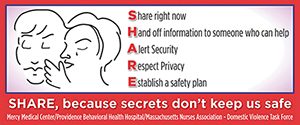By NANCY FRAZIER O'BRIEN
It's a statistic with which hospitals are all too familiar: One out of every three women and one in four men will be a victim of domestic violence sometime in his or her lifetime, according to the National Coalition Against Domestic Violence.
But what if the person being victimized by domestic violence — also known as intimate partner violence — is a co-worker?
In a project that arose during labor contract negotiations, registered nurses at Mercy Medical Center in Springfield, Mass., are learning to assist their fellow hospital employees in a way that guards both their privacy and their security.
Mercy Medical Center, a part of Livonia, Mich.-based Trinity Health, includes the 182-bed Mercy Medical Center in Springfield; the 126-bed Providence Behavioral Health Hospital in Holyoke, Mass.; and other affiliated ministries.
When nurses represented by the Massachusetts Nurses Association were negotiating a labor contract in 2014, both sides agreed to form a joint domestic violence task force, made up of nurses and hospital administrators.

Ringuette
"There had been some concerns from both parties as to a few different situations that had come up," said Roger Ringuette, manager of labor relations for Mercy Medical Center. "As I gained more information about the impact of domestic violence, it was clear that we needed to do more."
Task force member Cady Spencer, a registered nurse at Providence hospital, created the project's logo and slogan: "SHARE, because secrets don't keep us safe."
The acronym SHARE stands for:
- Share right now.
- Hand off information to someone who can help.
- Alert security.
- Respect privacy.
- Establish a safety plan.
The task force developed educational materials for all Mercy and Providence employees affected by domestic violence. Mercy provides security escorts and closer parking spaces for those facing threats of violence and help with restraining orders aimed at keeping abusers away from the employees and off hospital property. It also can move the employees to a less accessible area of the hospital, if appropriate; provide spiritual care; and plug the person in to a plethora of outside resources," Ringuette said.

A poster encourages employees who are victims of domestic violence to seek support from trusted colleagues and their employer.
"Most organizations have a lot of these provisions embedded in various policies, but they tend to be fragmented," he added. The task force brought together existing policies and resources, "then added to them as we became more educated."
The educational aspect of the project includes two informational sessions attended by more than 220 hospital employees; placards in bathrooms with tips on how to approach a possible victim of domestic violence; and articles in in-house publications. In the works is a module of self-directed, online training on domestic violence that will be offered to all employees.
The project also operates with "a level of concern for privacy," Ringuette said, and educates about "what to say and what not to say" if a supervisor or co-worker suspects that an employee might be experiencing domestic violence.
"If they feel like something is going on, they can approach (their co-worker), ask if they're OK, if there is anything going on that they want to talk about," he said. "But they don't want to say anything judgmental or anything that puts the burden on the victim. That could shut the individual down."
The task force, which is continuing to meet periodically, includes about eight permanent members, including Ringuette, the chief nursing officer, head of security, representatives of the Massachusetts Nurses Association and employees from both Mercy and Providence.
"Then as we touch upon different subjects, we bring in different members of frontline management, members of the behavioral health network and others," he said.
When the online teaching module is completed and has been tested by employees, task force members hope to share their work first with Trinity Health Of New England and then perhaps on a wider basis.
The project has its roots in a daylong program offered by the Domestic Violence and Sexual Assault Unit of the Northwestern District Attorney of Hampshire County, Mass., titled "Domestic Violence Affects All of Us: What Employers Can Do to Protect Your Business and Your Employees." Andrea Fox, a registered nurse who is an associate director in the Massachusetts Nurses Association's Division of Labor Action, raised the issue of support for domestic violence victims with Mercy nurses after attending the program and is now a member of the task force.
"The secretive nature of this crime allows it to continue," Fox said in a news release. "Through communication with peers who are ready to provide assistance, victims of domestic violence receive comfort and strength."
Ringuette encourages other hospitals and health systems to raise awareness of domestic violence among their workforce and look for ways to aid victims.
"This isn't as hard as it looks, because at the end of the day you probably have many of these pieces and they just need to be coordinated and people need to discover them," he said. "You can get here faster than you think you can."
Copyright © 2018 by the Catholic Health Association
of the United States
For reprint permission, contact Betty Crosby or call (314) 253-3490.